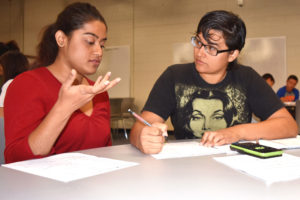
Margaret McKinney/Highlands University
Highlands chemistry senior and ARMAS math tutor Proity Nayeeb Akbar, left, explains an algebra problem to engineering freshman Jasmine Rodríguez. Akbar is from Bangladesh and Rodríguez is from El Paso, Texas.
Las Vegas, New Mexico – More women and Hispanic students at Highlands University will graduate with degrees that prepare them for science and technology jobs, thanks to a U.S. Department of Education grant.
The 3-year, $742,175 grant is funded through by the Minority Science and Engineering Improvement Program of the U.S. Department of Education. It will be administered through Highlands University’s award-winning Achieving in Research, Math and Science Center, or ARMAS.
“This grant will ultimately help diversify the STEM workforce and fits into our historical mission at Highlands as a Hispanic Serving Institution,” said Edward Martínez, the former ARMAS director and current vice president of strategic enrollment management. “Nationwide, there’s a need for well-qualified STEM graduates to fill the growing number of science and technology jobs.”
Martínez, who is also a natural resources management professor, co-authored the grant along with Elizabeth Ratzlaff, the ARMAS Center director. The Los Alamos National Laboratory Office of Community Relations and Partnerships provided initial technical support for the grant writing.
“Overall, this grant will increase our capacity to better serve our students,” Ratzlaff said. “We’ll do this in two primary ways. The first is by strengthening our training programs for student employees who work with their peers, such as supplemental instruction leaders, math tutors and graduate teaching assistants.
“Another important component is developing a strategic plan to increase faculty collaboration across science disciplines to streamline student progress toward graduation. Within each discipline, faculty will be using curriculum mapping to align instruction with desired student learning outcomes – a best practice for increasing graduation rates,” Ratzlaff said.
ARMAS works with the academic disciplines of biology, chemistry, computer science, forestry, geology and math. Now in its seventh year, the ARMAS Center provides comprehensive support services to STEM students and faculty at Highlands.
Since 2009, ARMAS has helped more than 1,700 students at Highlands. Approximately 59 percent of these students are Hispanic and 46 percent are women. Science majors have increased 29 percent at the university since the program began.
Jasmine Rodríguez, an 18-year-old engineering freshman from El Paso, Texas, said she accesses the services at ARMAS three-to-four times per week.
“The ARMAS math tutors are really great and supportive, helping with whatever you need to understand the assignments,” Rodríguez said. “ARMAS is also a very homey and welcoming environment, which has helped me develop friendships with other students and tutors.”
ARMAS’ track record of success has led to national recognition. In 2014, Excelencia in Education named ARMAS as one of the top college programs in the nation for increasing graduation rates among Hispanic students.
In 2015, the White House Initiative on Educational Excellence for Hispanics named ARMAS for “Bright Spot” honors.
“The key to ARMAS’ success is the staff and student workers who make the center a friendly, supportive place to focus on succeeding in school,” Martínez said. “This new grant will build on this effective model.”
Ratzlaff said the peer-to-peer mentoring among the science students is powerful.
The Achieving in Research Math and Science Center at Highlands was established in 2009 with a $2.2 million grant from the U.S. Department of Education. Grants followed from the Kellogg Foundation, National Science Foundation, U.S. Department of Agriculture and Los Alamos National Laboratory.
